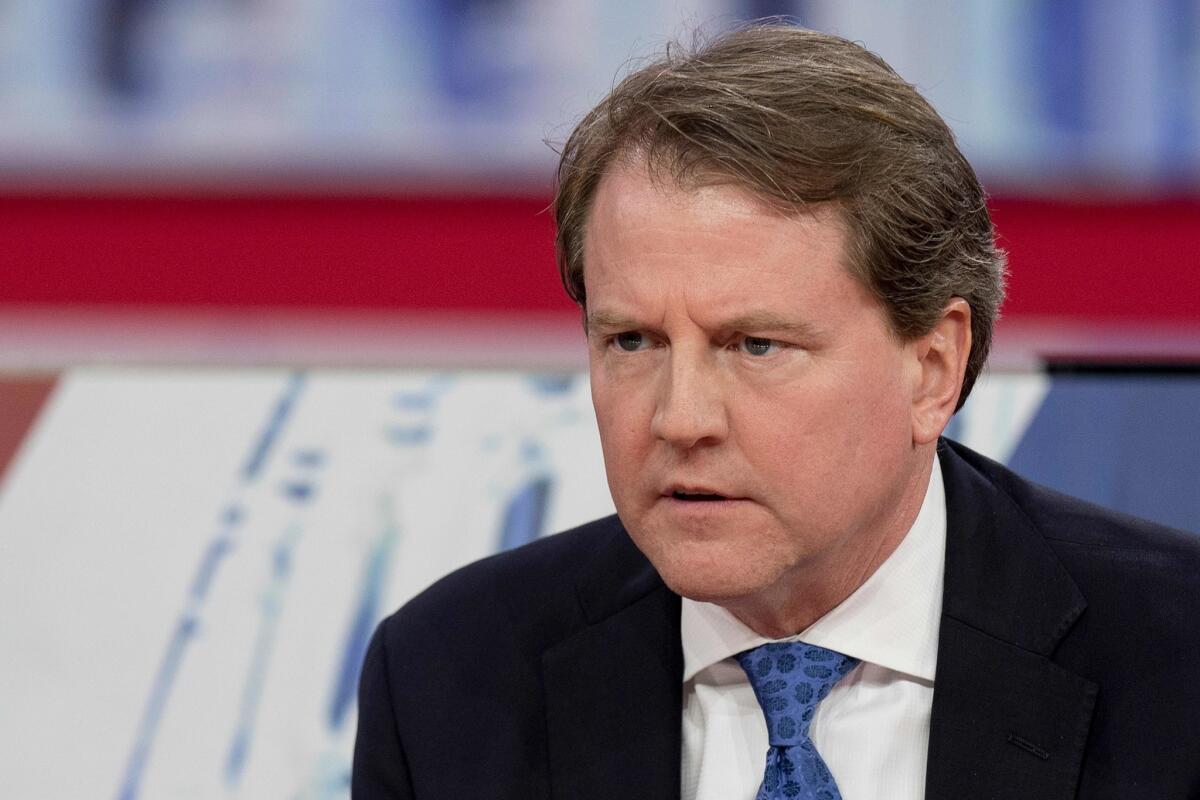Donald McGahn doesn’t deserve ‘absolute immunity.’ Neither does Bolton or Mulvaney

- Share via
Declaring that “presidents aren’t kings,” a federal judge has issued a ruling rightly instructing Donald Trump — and his successors — that a president can’t prevent advisors or former advisors from responding to a congressional subpoena for their testimony. It’s an important decision even if it doesn’t lead quickly to what House Democrats went to court to obtain: potentially incriminating testimony by a former top Trump advisor.
Monday’s ruling by U.S. District Judge Ketanji Brown Jackson stemmed from the House Judiciary Committee’s attempt to force former White House Counsel Donald McGahn to comply with a subpoena for his testimony.
According to the report by special counsel Robert S. Mueller III, there was “substantial evidence” to support McGahn’s account that the president had directed him to have Mueller removed as special counsel, a directive McGahn apparently ignored. If the House found that Trump attempted to obstruct Mueller’s probe, that could be grounds for an article of impeachment separate from one based on evidence that Trump linked aid to Ukraine with an investigation by that country of former Vice President Joe Biden.
In opposing the Judiciary Committee’s attempt to compel McGahn to testify, the administration argued, as previous administrations have done, that advisors to the president have “absolute testimonial immunity.” That breathtakingly broad concept means that, because they are “alter egos” of the chief executive, a president’s “immediate advisors” can’t be compelled by Congress to give testimony — or even show up at a hearing.
Jackson methodically dismantled that assertion. Citing a 2008 ruling involving a subpoena for Harriet Miers, former President George W. Bush’s counsel, Jackson argued persuasively that “absolute immunity from compelled congressional process simply does not exist.”
That doesn’t mean, she added, that presidential advisors subpoenaed by a congressional committee can’t assert “any legally applicable privilege in response to the questions asked of them, where appropriate.” But there is a world of difference between asserting executive privilege about a particular conversation with the president and refusing to testify at all.
And in its 1974 decision ordering President Nixon to turn over White House tape recordings sought in the Watergate investigation, the Supreme Court acknowledged that there were limits to executive privilege. That decision involved a criminal investigation, but an impeachment inquiry is also a matter of huge importance.
Welcome as it is as a repudiation of executive overreach, Jackson’s decision will not have an immediate effect. McGahn’s lawyers plan to appeal, and have asked that Jackson’s ruling be stayed in the meantime. A lawyer for former national security advisor John Bolton, who is widely reported to have opposed the effort to press Ukraine to investigate Biden, said Jackson’s decision doesn’t resolve the question of whether his client could testify in the impeachment inquiry.
Trump on Tuesday made it clear that he still opposes testimony by present and former officials. On Twitter (where else?), the president unconvincingly asserted that he “would actually like people to testify,” but was resisting congressional demands for the sake of “future presidents and the office of president.”
Trump hasn’t been protecting legal precedents, he’s been trying to establish new and unwelcome ones. The notion of absolute immunity was conjured up by prior administrations, not Congress or the courts. And in his full-on obstruction of the House, Trump has advanced the absurd notion that presidents should be able to dictate how that chamber exerts its constitutional impeachment power. Besides, if he truly wanted to his aides to testify, he could waive executive privilege for them without sacrificing his or his successors’ right to assert it in the future.
The impeachment machinery is humming along despite the lack of potentially useful testimony from McGahn, Bolton and acting White House Chief of Staff (and budget director) Mick Mulvaney. House Intelligence Committee Chairman Adam B. Schiff (D-Burbank) is expected to release a report after Thanksgiving that will serve of the basis for hearings by the Judiciary Committee, which would vote on any articles of impeachment. The Judiciary Committee, meanwhile, is scheduled to begin hearings next Wednesday, and Trump has been formally invited to participate.
In the last two weeks the House has amassed impressive evidence suggesting that Trump abused the powers of his office to gain a political advantage, much of that evidence obtained from dedicated public servants who testified despite the White House’s opposition. No doubt the record would be more complete with the testimony of McGahn, Bolton, Mulvaney and others. In opposing their involvement — and justifying it with an extreme legal theory now rejected by a court — Trump has himself to blame if the House must make do with the evidence it has.
More to Read
A cure for the common opinion
Get thought-provoking perspectives with our weekly newsletter.
You may occasionally receive promotional content from the Los Angeles Times.









